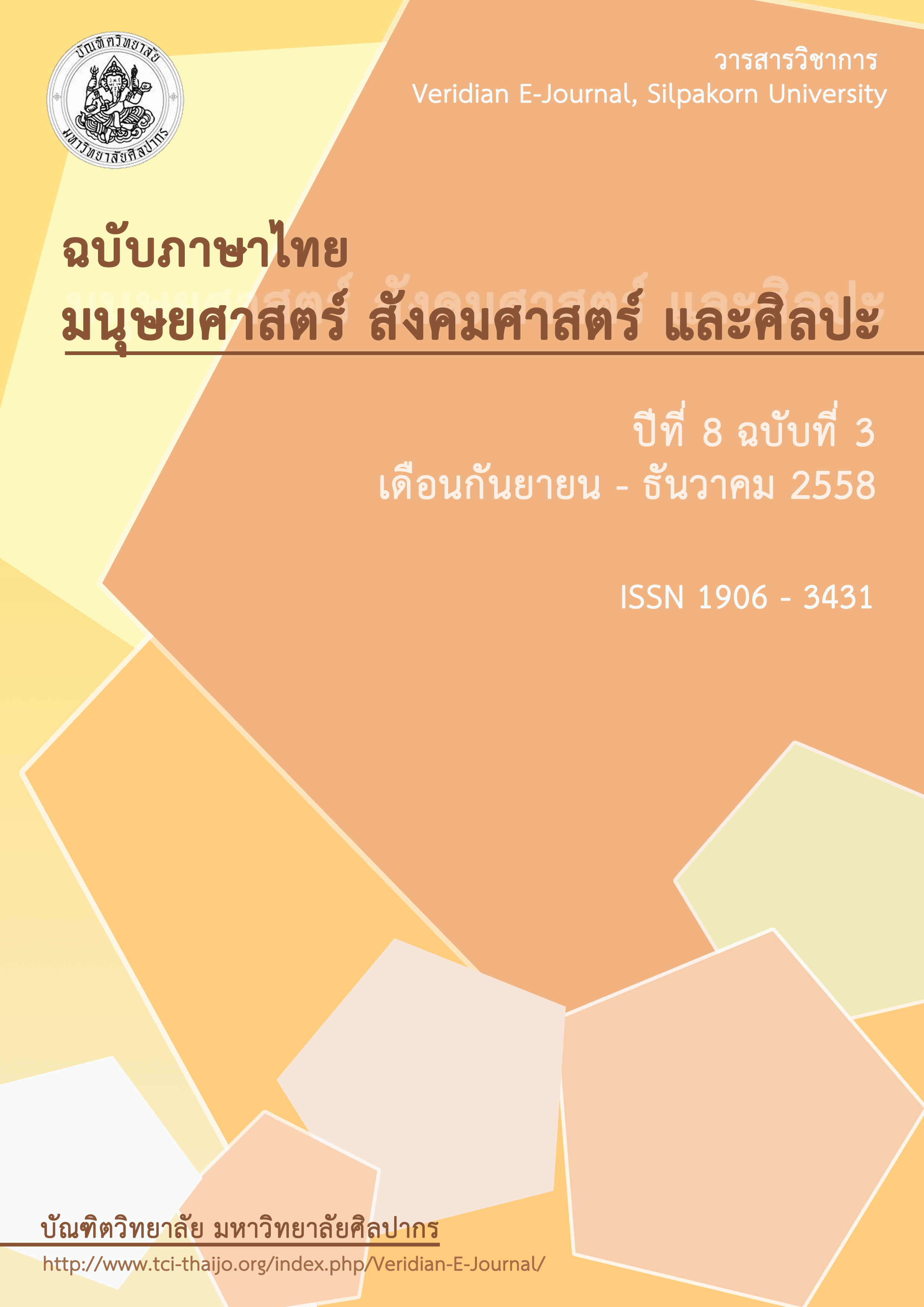ปัจจัยด้านคุณภาพในการให้บริการและการจัดการข้อร้องเรียนมีอิทธิพลต่อความพึงพอใจและ ความจงรักภักดีของลูกค้าในการสนับสนุนธุรกิจท่องเที่ยวเชิงเกษตรในประเทศไทย
Main Article Content
Abstract
บทคัดย่อ
การวิจัยเรื่องปัจจัยด้านคุณภาพในการให้บริการและการจัดการข้อร้องเรียนมีอิทธิพลต่อความพึงพอใจและความจงรักภักดีของลูกค้าในการสนับสนุนธุรกิจท่องเที่ยวเชิงเกษตรในประเทศไทย มีวัตถุประสงค์ (1) เพื่อศึกษาอิทธิพลของปัจจัยด้านคุณภาพในการให้บริการและการจัดการข้อร้องเรียนของลูกค้าที่มีผลต่อความพึงพอใจของลูกค้า (2) เพื่อศึกษาอิทธิพลของปัจจัยด้านคุณภาพในการให้บริการ การจัดการข้อร้องเรียนและความพึงพอใจของลูกค้าที่มีผลต่อความจงรักภักดีของลูกค้า (3) เพื่อศึกษาอิทธิพลของปัจจัยด้านความพึงพอใจและความจงรักภักดีของลูกค้าที่มีผลต่อการสนับสนุนธุรกิจท่องเที่ยวเชิงเกษตรในประเทศไทย ผู้วิจัยใช้วิธีวิจัยแบบผสมสานทั้งการวิจัยเชิงปริมาณและการวิจัยเชิงคุณภาพ
การวิจัยเชิงปริมาณ ผู้วิจัยใช้แบบสอบถามเป็นเครื่องมือในการเก็บรวมรวมข้อมูลกับลูกค้าที่เดินทางมาท่องเที่ยวธุรกิจท่องเที่ยวเชิงเกษตรที่อยู่ในจังหวัดที่มีการจดทะเบียนนิติบุคคลกับกรมพัฒนาธุรกิจการค้ามากที่สุด 5 จังหวัดตามการแบ่งเขตของกรมการท่องเที่ยว ประกอบด้วย จังหวัดนครราชสีมา จังหวัดเชียงใหม่ จังหวัดราชบุรี จังหวัดชลบุรีและจังหวัดภูเก็ต จำนวน 500 คน สถิติที่ใช้ในการวิเคราะห์ข้อมูลเชิงปริมาณ ได้แก่ ค่าเฉลี่ย (Mean) ส่วนเบี่ยงเบนมาตรฐาน (Standard Deviation) และการวิเคราะห์ตัวแบบสมการโครงสร้าง (Structural Equation Model : SEM) ด้วยโปรแกรม LISREL 8.80 ผลการวิเคราะห์ข้อมูลพบว่า ความพึงพอใจของลูกค้าได้รับอิทธิพลโดยรวมและอิทธิพลทางตรงจากปัจจัยด้านคุณภาพในการให้บริการมากที่สุด (TE,DE=0.789) น้อยที่สุดคือ ปัจจัยด้านการจัดการข้อร้องเรียนของลูกค้า (TE,DE=0.209) ความจงรักภักดีของลูกค้าได้รับอิทธิพลโดยรวมจากปัจจัยด้านความพึงพอใจของลูกค้ามากที่สุด (TE=0.977) รองลงมาคือ ปัจจัยด้านคุณภาพในการให้บริการ (TE=0.536) และน้อยที่สุดคือ ปัจจัยด้านการจัดการข้อร้องเรียนของลูกค้า (TE=0.385) โดยได้รับอิทธิพลทางตรงจากปัจจัยด้านความพึงพอใจของลูกค้ามากที่สุด (DE=0.977) น้อยที่สุดคือ ปัจจัยด้านการจัดการข้อร้องเรียนของลูกค้า (DE=0.181) และได้รับอิทธิพลทางอ้อมจากปัจจัยด้านคุณภาพในการให้บริการ (IE=0.771) น้อยที่สุดคือ ปัจจัยด้านการจัดการข้อร้องเรียนของลูกค้า (IE=0.204) การสนับสนุนธุรกิจของลูกค้าได้รับอิทธิพลโดยรวมจากปัจจัยด้านความพึงพอใจของลูกค้ามากที่สุด (TE=0.854) รองลงมาคือ ปัจจัยด้านคุณภาพในการให้บริการ (TE=0.553) รองลงมาคือ ปัจจัยด้านความจงรักภักดีของลูกค้า (TE=0.516) และน้อยที่สุดคือ ปัจจัยด้านการจัดการข้อร้องเรียนของลูกค้า (TE=0.272) โดยได้รับอิทธิพลทางตรงจากปัจจัยด้านความจงรักภักดีของลูกค้ามากที่สุด (DE=0.516) น้อยที่สุดคือ ปัจจัยด้านความพึงพอใจของลูกค้า (DE=0.350) และได้รับอิทธิพลทางอ้อมจากปัจจัยด้านคุณภาพในการให้บริการมากที่สุด (IE=0.553) รองลงมาคือ ปัจจัยด้านความพึงพอใจของลูกค้า (IE=0.504) และน้อยที่สุดคือ ปัจจัยด้านการจัดการข้อร้องเรียนของลูกค้า (IE=0.272)
การวิจัยเชิงคุณภาพ ผู้วิจัยใช้การสัมภาษณ์เชิงลึก (In-Depth Interview) กึ่งโครงสร้างกับผู้บริหารธุรกิจท่องเที่ยวเชิงเกษตรในระดับกรรมการผู้จัดการขึ้นไป จำนวน 5 คน โดยตรวจสอบความถูกต้องของข้อมูลแบบสามเส้า (Triangulation) ผลการวิจัยพบว่า ข้อสรุปที่ได้จากการสัมภาษณ์เชิงลึกมีความสอดคล้องกับการวิจัยเชิงปริมาณในด้านคุณภาพในการให้บริการ ความพึงพอใจของลูกค้า ความจงรักภักดีของลูกค้า การจัดการข้อร้องเรียนของลูกค้า และการสนับสนุนธุรกิจของลูกค้า
คำสำคัญ : ธุรกิจท่องเที่ยวเชิงเกษตร คุณภาพในการให้บริการ การจัดการข้อร้องเรียนของธุรกิจ ความพึงพอใจของลูกค้า ความจงรักภักดีของลูกค้า การสนับสนุนธุรกิจ
Abstrac
In this dissertation entitled “The Factors of Service Quality and Customer Complaints Handling Influencing Customer Satisfaction and Customer Loyalty Affecting to Customer Advocacy of Agrotourism Business in Thailand” the researcher examines (1) to study the factors influencing of service quality and customer complaints handling that affecting to customer satisfaction (2) to study the factors influencing of customer complaints handling and customer satisfaction that affecting to customer loyalty (3) to study the factors influencing to customer satisfaction and customer loyalty that affecting to customer advocacy. This research employs a quantitative and qualitative mixed method approach.
A questionnaire was employed as a quantitative instrument to collect data from tourism traveling on agrotourism business in the province that incorporation with the Department of Business Development, the five provinces by the demarcation of the Department of Tourism as following Nakhon Ratchasima, Chiangmai, Ratchaburi, Chonburi and Phuket of 500 people. Using the techniques of descriptive statistics the collected data were analyzed in terms of mean and standard deviation. In addition, the researcher also employed the Structural Equation Model (SEM) technique by LISREL 8.80 Program. The model employed in this study is appropriate for the empirical data. The results demonstrate that customer satisfaction were overall and direct influenced at the highest level by the factors of service quality ([total effect] TE, [direct effect] DE=0.789) at the lowest level was the factors of customer complaints handling (TE,DE=0.209). Customer loyalty was overall influenced at the highest level by the factors of customer satisfaction (TE=0.977) next in descending order was the factors of service quality (TE=0.536) and at the lowest level was the factors of customer complaints handling (TE=0.385). The most direct influenced by the factors of customer satisfaction (DE=0.977) at the lowest level was the factors of customer complaints handling (DE=0.181). Indirect influence was by the factors of service quality (IE=0.771) at the lowest level was the factors of customer complaints handling (IE=0.204). Customer advocacy was overall influenced at the highest level by the factors of customer satisfaction (TE=0.854) next in descending order were the factors of service quality (TE=0.553) the factors of customer loyalty (TE=0.516) and at the lowest level was the factors of customer complaints handling (TE=0.272). The most direct influenced by the factors of customer loyalty (DE=0.516) and at the lowest level was the factors of customer satisfaction (DE=0.350). Indirect influence was by the factors of service quality (IE=0.553) next in descending order were the factors of customer satisfaction (IE=0.504) at the lowest level was the factors of customer complaints handling (IE=0.272).
In depth semi-structure interview was used as a qualitative instrument to collect data from the executive establishment of agrotourism president 5 persons to check the accuracy of the data centers by triangulation. The results showed that the conclusions obtained from the in-depth interview are in line with the quantitative research on service quality, customer complaints handling, customer satisfaction, customer loyalty and customer advocacy.

